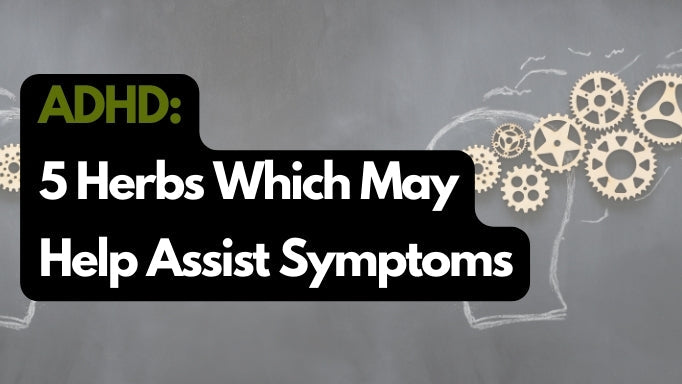
Attention Deficit Hyperactivity Disorder (ADHD) affects millions worldwide, impacting focus, impulsivity, and overall quality of life. Celebrities such as the likes of singer Cat Burns, TV presenter Ant McPartlin, Love Island's Jessie Renée Wynter, and even Married at First Sight star Sophie Brown have all come out as having ADHD. While conventional treatments like medication and therapy are essential, many individuals seek complementary approaches to manage symptoms. At Vita Herbal Nutrition, we aim to empower individuals with holistic and natural solutions to support their health and well-being.

The History Behind ADHD and Its Relevance Today
ADHD has historically been recognised as a childhood disorder, primarily affecting boys. The first clinical descriptions date back to the early 20th century, but it wasn't until the 1980s that ADHD became widely acknowledged and understood as a medical condition. Over time, research has evolved, revealing that ADHD persists into adulthood and affects both genders. Recently, there has been a surge in adult women being diagnosed with ADHD. This is partly due to the historical underdiagnosis in girls, as their symptoms often differ from boys and are less disruptive, leading to them being overlooked. In adulthood, women may seek help for issues like anxiety, depression, or chronic disorganisation, only to discover that ADHD is the underlying cause. This shift highlights the need for greater awareness and understanding of how ADHD manifests differently across genders and throughout life stages.
Potential Signs of ADHD
- Inattention
- Hyperactivity
- Impulsivity
Potential Effects of ADHD
- Academic Challenges
- Workplace Difficulties
- Relationship Issues
- Emotional and Psychological Impact
- Behavioural Problems
- Physical Health Concerns
- Social Difficulties
5 Potential Herbs to Manage ADHD Symptoms
Explore five herbs that traditional Chinese medicine suggests may support ADHD symptom management.
1. American Ginseng (Ren Shen)
Known for its potential adaptogenic properties, American Ginseng may enhance cognitive function and attention span. It's believed to support mental clarity and reduce hyperactivity, making it potentially beneficial for individuals with ADHD.

2. Angelica Root (Dang Gui)
Angelica root is renowned in Chinese medicine for its calming effects on the mind and body. It may help alleviate restlessness and improve focus, making it a potential ally for ADHD symptom management.

3. Astragalus Root (Huang Qi)
Astragalus root is prized for its immune-boosting properties and may also support mental clarity. It's used to potentially strengthen the spleen and enhance energy levels, which can be beneficial for individuals struggling with ADHD-related fatigue.

4. Jujube Dates (Da Hong Zao)
Jujube dates are rich in potential nutrients and known for their calming effects. They may help stabilise mood swings and promote relaxation, potentially aiding in reducing ADHD-related anxiety and irritability.

5. Black Sesame Seeds (Hei Zhi Ma)
Black sesame seeds are a potentially nutrient-dense food in Chinese cuisine and medicine. They are believed to nourish the brain and improve cognitive function and memory, potentially benefiting those with ADHD.

These herbs are traditionally used in various forms, including teas, capsules, and powders. However, it's crucial to consult with a healthcare practitioner knowledgeable in herbal medicine before starting any new regimen, especially if you're currently taking medications or have underlying health conditions.
Coping Tips for ADHD
Living with ADHD can be challenging, but incorporating practical coping strategies into your daily routine can make a significant difference:

-
Structured Routine: Establishing a consistent daily schedule helps minimise distractions and enhances focus.
-
Break Tasks into Smaller Steps: Breaking tasks into manageable chunks makes them less overwhelming and increases productivity.
-
Use of Timers and Alarms: Set reminders for tasks and transitions to stay on track throughout the day.
-
Physical Exercise: Regular physical activity can improve concentration, mood, and overall well-being.
-
Mindfulness and Relaxation Techniques: Practices like meditation or deep breathing can help reduce stress and improve attention span.
Seeking Advice from a Local Practitioner
While herbs can complement ADHD treatment, individual responses vary. Consulting a local herbalist or TCM practitioner can provide personalised guidance on herb selection, dosage, and potential interactions with medications. They can also recommend other holistic approaches that align with your specific needs and health goals.

Summary
At Vita Herbal Nutrition, we believe in the holistic approach to health, integrating traditional wisdom with modern science to support individuals on their wellness journey. If you're considering herbal remedies for ADHD or any health condition, prioritise safety and efficacy by seeking expert advice.
Incorporate the knowledge of herbs from Vita Herbal Nutrition into your life responsibly by consulting a professional. ADHD can be managed with a holistic approach, blending traditional herbs with contemporary practices for enhanced well-being.
